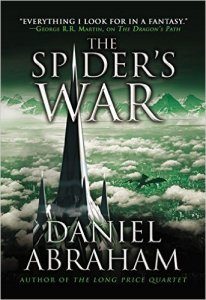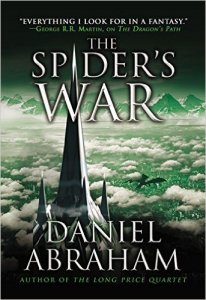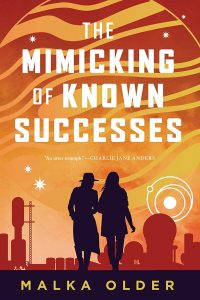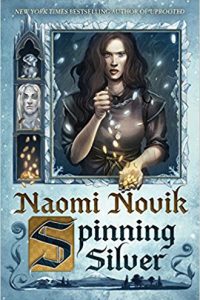Tim Pratt reviews Daniel Abraham
The Spider’s War, Daniel Abraham (Orbit 978-0316204057, $16.00, 526pp, tp) March 2016.
 Daniel Abraham has gotten a lot of attention lately, but mostly as half of the writing team James S.A. Corey (with Ty Franck). Their popular Expanse space opera is one of my favorite SF series, but it does tend to overshadow the equally good and quite different fantasy saga Abraham writes solo, the Dagger and the Coin. That series has just concluded with fifth volume The Spider’s War, and it’s hard to talk about the end without giving away details from the beginning and middle, so if you’re spoiler-averse, consider yourself warned.
Daniel Abraham has gotten a lot of attention lately, but mostly as half of the writing team James S.A. Corey (with Ty Franck). Their popular Expanse space opera is one of my favorite SF series, but it does tend to overshadow the equally good and quite different fantasy saga Abraham writes solo, the Dagger and the Coin. That series has just concluded with fifth volume The Spider’s War, and it’s hard to talk about the end without giving away details from the beginning and middle, so if you’re spoiler-averse, consider yourself warned.
The series is set in a world where, long centuries ago, dragons biologically manipulated baseline humans (known as ‘‘Firstbloods’’) to create a dozen other races of humanity, from the canine Tralgu, to the insect-like Timzinae, to the scaled Jasuru, and more. Centuries after the dragons annihilated themselves in a terrible war, those onetime servitor races have thrived, bred (and sometimes interbred), and carved up the world into their own kingdoms, with the dragons now remembered mostly as legends.
The series follows several characters through a time of war and upheaval driven by an ancient weapon of the dragons: tiny spiders that infest human bodies and give the infected the ability to detect lies and to compel listeners to believe anything the infected say. Most of those with spiders in their blood are zealots who believe they are the priests of a (wholly imaginary) spider goddess, and they convince the insecure and bookish Antean nobleman Geder Palliako that he is the goddess’s chosen one, destined to unite the world. Over the course of the series, Geder – a figure who is alternately pathetic, clownish, sympathetic, and terrifying – follows an unlikely path to power, eventually ruling the Antaean empire as regent to a precocious child prince. With the help of the spider priests, Geder sets out to conquer the world, and wages a campaign of genocide against the Timzinae, a race largely immune to the power of the spiders and thus deemed enemies of the goddess.
Opposing Geder is an unlikely group of allies including the legendary general and curmudgeon Marcus Wester; the young and brilliant banker Cithrin bel Sarcour; actor Master Kit, a former priest of the spider goddess who realized there was a difference between believing something was true and it actually being true; and Clara Kalliam, wife of a nobleman who unsuccessfully led a rebellion against Geder. There’s a late addition to that alliance, too: Inys, the last dragon, has awakened from his long slumber, and seeks to destroy the spiders, making him a powerful ally… except he also wants to bring back the race of dragons and turn all humanity into slaves again, which is less than ideal.
All those arrayed against Geder (Inys included) have suffered profound losses and setbacks throughout the course of the series, but as the Antaean army over-extends itself in the mistaken belief that the goddess won’t allow them to be defeated, and the cult of the spider goddess schisms into factions each convinced of their own absolute rightness, the disparate allies see an opportunity to win. One of the great elements of this series is the emphasis on economics (it’s the Dagger and the Coin, after all), and Cithrin’s genius is to fight a war with the tools of banking: negotiation, canny trades, starving the enemy of supplies by buying up materials, offering cash bounties for priests. (She also invents paper money, which helps a lot.)
Soon the allies realize it’s not enough to annihilate the spider priests and defeat Palliako’s armies. The justifiably vengeful armies of the conquered nations will doubtless destroy all of Antea, perpetuating the cycle of war and killing countless thousands of innocent people in the process. Cithrin decides they shouldn’t just focus on defeating their enemy: they should try to find a way to defeat war itself, or at least make peace more attractive. Ending war is a lofty goal, and probably impossible in the long term, but when your team includes a tactical genius, a banking prodigy, an actor who can make you believe anything, a noblewoman with courtly manners and an indomitable will, and a literal dragon, you can achieve amazing things.
The resolution of the series is quite satisfying, particularly in regard to Palliako’s ultimate fate. He was undeniably a villain, but never an entirely unsympathetic one, and Abraham pens an ending for him that recognizes his humanity without forgiving his unforgiveable sins. All the characters receive endings that are, if not always happy, at least appropriate, and when I closed the book, I felt like I was saying goodbye to old friends. If you’ve been following the series, rest assured it ends well, and if you haven’t, pick up The Dragon’s Path and start reading.








